Life Sciences News
See our Latest Journal Publications
SBRI funding received to develop diagnostic biosensors for strokes
Sarissa Biomedical, a spin-out company established by Professor Nick Dale, Ted Pridgeon Professor of Neuroscience in the School of Life Sciences, has been awarded £150,000 from Innovate UK’s Small Business Research Initiative (SBRI). Sarissa Biomedical has pioneered highly sensitive analytical devices known as microelectrode biosensors, which can be used to monitor in real-time the levels of purines - neurochemicals that influence the function of the nervous system. These biosensors have been used to demonstrate that purines are elevated in the blood of stroke patients compared to healthy controls.
Stroke is one of the leading causes of death and disability in the UK – in 2010 there were an estimated 150,000 strokes and 50,000 deaths attributable to stroke. Stroke currently costs the UK economy approximately £9billion per year in health and social care costs. Rapid treatment of ischaemic strokes to remove the blockage of cerebral circulation can allow perfect recovery and avoid lasting disability. On average for every 15 minutes saved in the period from stroke onset to the provision of treatment, one extra month of disability-free life is achieved. Point-of-care tests that can detect stroke from its earliest moments would help to shorten treatment delays and ensure that as many patients as possible receive treatment.
The SBRI funding will enable the project team to develop the biosensor technology into a prototype diagnostic device for strokes that can be used by paramedics. It will also support the analysis of the stroke clinical pathway to determine how the device can be used most effectively, and it will allow the design of a large-scale clinical trial involving paramedics and ambulance staff across the UK. Deployment of this test with paramedics will allow speedier identification of stoke victims at the point of injury, and facilitate rapid coordination of the clinical treatment pathway to maximise the chances of the best possible patient outcomes.
Professor John McCarthy receives MRC award to identify novel drug therapies
 Professor John McCarthy, Professor of Molecular Systems Biology at the University of Warwick School of Life Sciences, and Director of the Warwick Integrative Synthetic Biology Centre (WISB), has received funding from the MRC to pursue research on ’Protein synthesis in trypanosomatids as a target for novel drug therapies’. The FEC award of £360k will be complemented by a simultaneous award from Fundação Araucária in the State of Paraná (Brazil) to collaborators in the Carlos Chagas Institute in Curitiba. Colleagues at the University of Leeds will also be involved in the project.
Professor John McCarthy, Professor of Molecular Systems Biology at the University of Warwick School of Life Sciences, and Director of the Warwick Integrative Synthetic Biology Centre (WISB), has received funding from the MRC to pursue research on ’Protein synthesis in trypanosomatids as a target for novel drug therapies’. The FEC award of £360k will be complemented by a simultaneous award from Fundação Araucária in the State of Paraná (Brazil) to collaborators in the Carlos Chagas Institute in Curitiba. Colleagues at the University of Leeds will also be involved in the project.
Trypanosomatids are parasites that migrate between insect vectors and mammalian hosts. They cause a number of highly debilitating and potentially fatal diseases with major impacts on human health and wellbeing on a global scale. Trypanosoma cruzi, which causes Chagas disease, is believed to affect at least 11 million people in Mexico, Central America and South America. Leishmania is now endemic in South America, the Middle East, Asia, Africa and more than 20 countries in Europe.
Given that the current anti-parasitic treatments are unpleasant, not fully effective, and encountering resistance, there is an urgent need for a new strategy to identify safe, efficacious drugs. This collaborative project will explore whether drugs can be developed based on selective targeting of protein-protein interactions in the trypanosomatid protein synthesis machinery.
The project was funded through MRC’s UK-Brazil Neglected Infectious Diseases Partnership scheme.
Warwick extends synthetic biology collaborations with Brazil
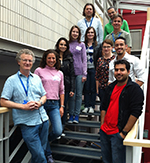 Katherine Denby, Vardis Ntoukakis and Patrick Schafer have been awarded £39,000 for establishing research collaborations between the plant synthetic biology group of Warwick Intregrative Synthetic Biology Centre (WISB) and the Biomass Systems and Synthetic Biology Center (BSSB) at the University of São Paulo.
Katherine Denby, Vardis Ntoukakis and Patrick Schafer have been awarded £39,000 for establishing research collaborations between the plant synthetic biology group of Warwick Intregrative Synthetic Biology Centre (WISB) and the Biomass Systems and Synthetic Biology Center (BSSB) at the University of São Paulo.
The funding from the Warwick–FAPESP Sprint scheme will fund a number of initiatives over two years, with the partnership lead on the Brazilian side by Prof Marie-Anne Van Sluys. Specific activities are planned to strengthen the collaboration and leverage additional research funding. We will build on the success of our Plant Synthetic Biology workshop at Warwick in September 2014 which was attended by 9 Brazilian PhD students and early career scientists, and run a second workshop in early 2016 with increased inclusion of synthetic biology engineering concepts. Two grant writing workshops will be held, one at Warwick and one in São Paulo, to develop proposals for EMBO and FAPESP funding for future Synthetic Biology workshops and joint applications for BBSRC-FAPESP research grant funding. Specific research exchanges by early career scientists and undergraduate students in both directions will build the collaboration at all levels.
IAS Fellowship success for PhD students
School of Life Sciences PhD students Max Newbert and Nicola Galley have been awarded Early Career Fellowships by the University of Warwick’s Institute of Advanced Study (IAS). The fellowships are designed to support Warwick doctoral candidates in the transition phase between their doctoral and postdoctoral careers. In addition to continuing research carried out during their PhD projects, Fellows have the opportunity to participate in collegiate and career development activities including leading a research-orientated workshop for other members of the IAS, assisting at the IAS-led Research Showcase events, and attending the weekly Academic Careers and Employment programme.
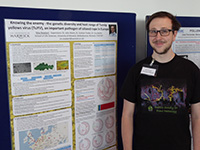 Max’s fellowship will focus on continuing and publishing research completed during the course of his BBSRC PhD studentship entitled 'The genetic diversity of Turnip yellows virus in oilseed rape (Brassica napus) in Europe, pathogenic determinants, new sources of resistance and host range'. Max’s studentship received extra funding from the Perry Foundation, a UK charity that promotes education and research connected with agriculture or food production for the benefit of the public. Turnip yellows virus (TuYV) is a major threat to oilseed rape and other brassicas reducing yields by up to 65%. Very high levels of virus have been detected in this year’s crop and there is evidence of 20-24% reduction in yield due to TuYV, from crops harvested so far. Max’s work has highlighted the prevalence of the virus in mainland Europe, identified isolates with novel host ranges and identified significant and new information on the phylogeny of the species, all of which are important for breeding resistant plant lines. The fellowship will be carried out at Wellesbourne under the supervision of Dr John Walsh.
Max’s fellowship will focus on continuing and publishing research completed during the course of his BBSRC PhD studentship entitled 'The genetic diversity of Turnip yellows virus in oilseed rape (Brassica napus) in Europe, pathogenic determinants, new sources of resistance and host range'. Max’s studentship received extra funding from the Perry Foundation, a UK charity that promotes education and research connected with agriculture or food production for the benefit of the public. Turnip yellows virus (TuYV) is a major threat to oilseed rape and other brassicas reducing yields by up to 65%. Very high levels of virus have been detected in this year’s crop and there is evidence of 20-24% reduction in yield due to TuYV, from crops harvested so far. Max’s work has highlighted the prevalence of the virus in mainland Europe, identified isolates with novel host ranges and identified significant and new information on the phylogeny of the species, all of which are important for breeding resistant plant lines. The fellowship will be carried out at Wellesbourne under the supervision of Dr John Walsh.
 Nicola’s fellowship will build on research undertaken during her BBSRC PhD studentship on 'The role of species-specific modifications in peptidoglycan biosynthesis'. Antimicrobial Resistance (AMR) is a catastrophic threat to human health, dramatically reducing the effectiveness of drugs that we have come to rely on in common medical practice. It has been predicted that if resistance continues to grow at the same rate, 10 million people will die every year as a direct result of AMR infections by 2050. Understanding the bacterial cell wall and its main component, peptidoglycan, is vitally important in the development of new antimicrobials. Penicillin binding proteins (PBPs) are responsible for making peptidoglycan and are excellent targets for antimicrobial drugs as they are essential for cell viability. Nicola’s research identified a critical PBP substrate recognition phenomenon in Streptococcus pneumonia that has led to significant advances in understanding the cell wall synthesis process. During the fellowship Nicola aims to write several high-impact publications, present her research at international interdisciplinary conferences, and organise a symposium at Warwick on the topic of antimicrobial resistance. The fellowship will be carried out under the supervision of Dr David Roper and Prof Chris Dowson.
Nicola’s fellowship will build on research undertaken during her BBSRC PhD studentship on 'The role of species-specific modifications in peptidoglycan biosynthesis'. Antimicrobial Resistance (AMR) is a catastrophic threat to human health, dramatically reducing the effectiveness of drugs that we have come to rely on in common medical practice. It has been predicted that if resistance continues to grow at the same rate, 10 million people will die every year as a direct result of AMR infections by 2050. Understanding the bacterial cell wall and its main component, peptidoglycan, is vitally important in the development of new antimicrobials. Penicillin binding proteins (PBPs) are responsible for making peptidoglycan and are excellent targets for antimicrobial drugs as they are essential for cell viability. Nicola’s research identified a critical PBP substrate recognition phenomenon in Streptococcus pneumonia that has led to significant advances in understanding the cell wall synthesis process. During the fellowship Nicola aims to write several high-impact publications, present her research at international interdisciplinary conferences, and organise a symposium at Warwick on the topic of antimicrobial resistance. The fellowship will be carried out under the supervision of Dr David Roper and Prof Chris Dowson.
Congratulations to Max and Nicola on their success!
Researchers have been awarded over £1.3m to research food security
Researchers from the University of Warwick’s School of Life Sciences (SLS) have been awarded over £1.36m in grants to further their work into food security.
The BBSRC Horticulture and Potato Initiative (HAPI) grants include substantial cash and in-kind contributions from industrial partners and will be used to support work into how to improve pest and disease control and post-harvest quality.
Commenting on the grants Professor Laura Green, Head of SLS, said:
“The BBSRC HAPI grants will help ensure that the University of Warwick’s School Life Sciences continues to play a leading role in improving food production globally. The Warwick HAPI-funded projects will result in substantial impacts on the horticulture industry by translating research findings into solutions that benefit several stages in the food supply chain, including farmers, processors and retailers.”
Nick Dale, Professor of Neuroscience awarded £755,273 from BBSRC for his project 'Amino acid sensing by hypothalamic tanycytes'
 Nick Dale, Professor of Neuroscience in the School of Life Sciences, has been awarded £755,273 from BBSRC for his project on ‘Amino acid sensing by hypothalamic tanycytes’.
Nick Dale, Professor of Neuroscience in the School of Life Sciences, has been awarded £755,273 from BBSRC for his project on ‘Amino acid sensing by hypothalamic tanycytes’.
The research will focus on specialised cells known as tanycytes, which play a crucial role in detecting the levels of important metabolites such as amino acids and glucose in the brain.
This sensing mechanism helps the brain to regulate the balance between energy storage and expenditure, leading to the gain and loss of body weight, so understanding the biological factors involved in these processes could lead to major impacts on health and wellbeing.
IAS Fellowship success in SLS
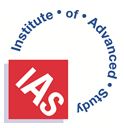 John Sidda has been awarded an Early Career Fellowship from the University of Warwick’s Institute of Advanced Study (IAS).
John Sidda has been awarded an Early Career Fellowship from the University of Warwick’s Institute of Advanced Study (IAS).
John, who recently completed a PhD under the supervision of Dr Chris Corre in the School of Life Sciences and the Department of Chemistry, will build on his previous research on the regulatory mechanisms involved in bacterial natural product biosynthesis, which led to the discovery of new natural products from Stremtomyces venezuelea.
His Fellowship project, which was co-funded by the School of Life Sciences’ Pump Priming Fund, aims to develop the methodology used for natural product discovery in other Streptomyces species.
BBSRC award £601,861 to study Footrot in sheep

Professor Laura Green and Dr Kevin Purdy from the School of Life Sciences and Professor Matthew Keeling from the School of Life Sciences and the Mathematics Institute, at the University of Warwick have been awarded £601,861 to study the issue of Footrot in sheep.
The Biotechnology and Biological Sciences Research Council's (BBSRC) Animal Health Research Club (ARC) announced the award on Friday 27th March 2015 as part of a range of new research projects to improve the health of livestock.
Professor Laura Green, Head of the School of Life Sciences at the University of Warwick said:
“Footrot is very common in sheep in the UK, affecting more than 95% of sheep flocks. Footrot is caused by Dichelobacter nodosus, a bacterium that causes inflammation of the skin of the foot which leads to lameness. Using swab samples collected from the feet of sheep kept under different managements, the study will determine which molecular factors in Dichelobacter nodosus and which managements in sheep are most important in disease progression and how these lead to disease spread and persistence, informing on potential approaches to improve flock resilience to the disease."
Dr Celia Caulcott, BBSRC Executive Director, Innovation and Skills, said:
"By targeting these livestock diseases the Animal Health Research Club projects have the potential to protect farmed animals and food supplies and save UK farmers and the wider economy millions of pounds a year.”
“The Club shows that the public sector and private industry can work together to fund and support excellent research tackling important research challenges.”
Press release
Nick Dale, Professor of Neuroscience awarded a prestigious Royal Society Wolfson Research Merit Award
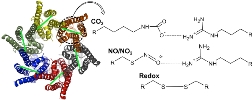 Nick Dale, Professor of Neuroscience in the School of Life Sciences, has been awarded a prestigious Royal Society Wolfson Research Merit Award, which recognises experienced researchers with a track record of outstanding achievements and the potential to make further significant contributions to their field of research.
Nick Dale, Professor of Neuroscience in the School of Life Sciences, has been awarded a prestigious Royal Society Wolfson Research Merit Award, which recognises experienced researchers with a track record of outstanding achievements and the potential to make further significant contributions to their field of research.
The funding will support Nick’s research on the role of CO2 sensing mediated by connexin-26 in health and disease. Connexin-26 is a protein that forms a channel between neighbouring cells, allowing them to communicate with one another via the movement of signalling molecules; it is found in specialised nerve cells in the brain and has been implicated in the regulation of breathing.
This pioneering study has the potential to make very significant advances in the understanding of CO2-mediated signalling in the brain by linking the structural biology of connexin-26 channels and cell signalling to neurophysiological function, offering the prospect of major impacts on human health through the advanced understanding of the regulation of cerebral blood flow and the roles of this novel CO2-signalling mechanism.
New £12 million Synthetic Biology Centre to help drive advances in biotechnology, medicine and food security
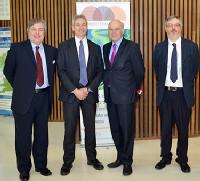 Researchers at the Warwick Integrative Synthetic Biology Centre (WISB), University of Warwick, that brings together disciplines including Life Sciences, Engineering, Chemistry, Computer Science, Education, and Law, have won a £12 Million award to create a new Centre to develop advanced technologies in synthetic biology.
Researchers at the Warwick Integrative Synthetic Biology Centre (WISB), University of Warwick, that brings together disciplines including Life Sciences, Engineering, Chemistry, Computer Science, Education, and Law, have won a £12 Million award to create a new Centre to develop advanced technologies in synthetic biology.
Vince Cable, the Secretary of State for Business, Innovation and Skills announced the new Centre as part of a £40M investment in UK synthetic biology, at the Manchester Institute for Biotechnology on Thursday 29th January.
Professor John McCarthy, Director of WISB and from the School of Life Sciences (pictured above with Vince Cable), said:
" We are delighted to receive this strategically important UK Synthetic Biology Centre Award. Synthetic biology has huge potential to generate valuable processes and products for biotechnology and medicine, as well as new understanding of the fundamental principles that underpin living systems. WISB is building a globally recognized presence as a centre of excellence in research and training in Synthetic Biology, and this grant from BBSRC and EPSRC will help us enormously in achieving our goals.”
Liz Wellington awarded £450,000 by NERC as part of strategic initiative on Environmental Microbiology and Human Health
Liz Wellington has been awarded £450,000 by NERC for ‘Using next generation sequencing to reveal human impact on aquatic reservoirs of antibiotic resistant bacteria at the catchment scale’.
The three-year project was funded through NERC’s strategic initiative on Environmental Microbiology and Human Health, which aims to provide the scientific evidence to support fast and efficient identification of pathogenic/allergenic microorganisms and biological material in environmental media which can be used in appropriate tools and models for the protection of public health.
Pathfinder Award for bee project
Prof David Evans has received an award from BBSRC’s Pathfinder Follow-on Fund for a project on antiviral therapies for honeybees. The Follow-on Fund supports the translation of fundamental research into practical application, including commercialisation, and aims to help researchers maximise the societal and economic benefits of their research.

